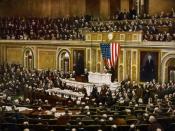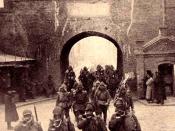The League did not, in the long term, succeed. There were a variety of fundamental, flaws that did not permit the league to succeed. The League, unlike the United Nations, lacked an armed force and depended on the Great Powers to enforce its resolutions, which they were very reluctant to do. Economic sanctions, the most severe measure after military action, were difficult to enforce and had no great impact on the target country. This was because they could simply trade with those outside the League.
The League's two most important members, Britain and France, were reluctant to use sanctions and even more reluctant to resort to military. Very soon after the First World War, the populations and governments of the two countries became pacifistic. The British were especially lacked enthusiasm and preferred to negotiate treaties without the involvement of the league.
Representation at the League was often a problem. Though it was intended to encompass all nations, many never joined, or only joined for a short time.
A key point was that the United States never joined. Even though Woodrow Wilson had been a driving force behind the League of Nations, the Senate voted not to join the League. This took much of the League's potential influence and power away. The Soviet Union, was only a member for five years. Even then, it was just to antagonise Germany whenever possible. The USSR was expelled for aggression, after it invaded Finland. Japan (who saw it as Euro-Centric) and Italy began as permanent members, but withdrew from the League. Germany, had been accepted but were pulled out as soon as Hitler came to power.
The league also failed in many specific crises. The biggest of these was the Japanese invasion of Manchuria. This crisis was major set back for the league.



Not enough detail.
For a grade 12 essay I would expect clear analysis of how EXACTLY Manchuria and Abysinnia led to its discreditation. I would expect sources, and some critical analysis of various sources.
On the whole this reads like the information had all been derived from johndclare.net.
2 out of 5 people found this comment useful.